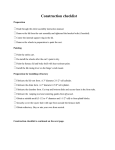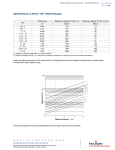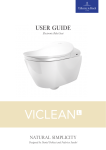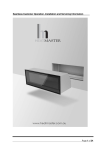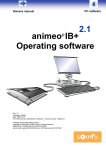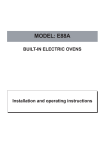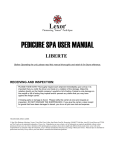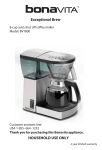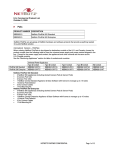Download STICKTITE ™ & PILOTPAK ™ Flame retention nozzles
Transcript
Low Temperature Burners - STICKTITE™ and PILOTPAK™ Nozzles 1 -1.1 - 1 E - i - 11/10 STICKTITE™ & PILOTPAK™ Flame retention nozzles For open-port firing or open environment firing Provides positive flame retention and stable clean burning, while directing the torch-shaped flame onto products or through open ports to your heat processes Economical, flexible method of heating processes Wide variety of sizes and configurations for optimal selection and sizing Integral pilot on PILOTPAK™ nozzles provides simplified integration of pilot, ignition and flame sensing w w w . m a x o n c o r p . c o m combustion systems for industry Maxon reserves the right to alter specifications and data without prior notice. © 2010 Copyright Maxon Corporation. All rights reserved. 1 - 1.1 - 2 E - i - 11/10 Low Temperature Burners - STICKTITE™ and PILOTPAK™ Nozzles Product description STICKTITE™ and PILOTPAK™ nozzles are designed for direct-fired air heating and/or open-port firing into a furnace, duct, or immersion tube. These nozzles are also useful for applying flames directly to products in processes such as flame laminating plastics, soldering, paint removal, rail car heating and hair removal from processed livestock. The single torch-like flame creates a venturi effect that pulls secondary air in around the burner nozzle and provides necessary cooling of the cast metal nozzle. Principle of operation The burner nozzle is threaded onto the feed manifold from an air/fuel premixing device. This premixture is directed out through the nozzle’s main port. A small portion of the premixture is channeled out through the smaller ignitor ports that surround the large main port. The gas/air mixture is ignited by a spark ignitor or separate pilot assembly. The turbulence created on the face of the nozzle provides positive flame retention of the torch flame emitted out of the main port. The flames from the tiny ignitor ports are protected from outside air turbulences and surround the base of the main flame to continually ignite the premixture being forced out of the nozzle by the mixture pressure from your mixing device. 2 1 1) Ignitor ports 2) Main port 3) Air/gas premixture from mixing device 4) Spark ignitor port (for direct spark versions) 4 3 w w w . m a x o n c o r p . c o m combustion systems for industry Maxon reserves the right to alter specifications and data without prior notice. © 2010 Copyright Maxon Corporation. All rights reserved. Low Temperature Burners - STICKTITE™ and PILOTPAK™ Nozzles 1 -1.1 - 3 E - i - 11/10 Available versions STICKTITE™ nozzles are available in three versions for a variety of temperature and application conditions. The STICKTITE™ may also be equipped with a direct spark ignitor, a mounting and support bracket or with loose pilot assemblies. • HD nozzles are cast iron burners with eight ignitor ports for low temperature applications (< 1000°F) for firing applications with slight draft (less than 0.5”wc). HD nozzles should also be used for any application where differential mixture pressure to the nozzle exceeds 7”wc. • BP nozzles are cast iron burners with four ignitor ports for low temperature applications (< 1000°F) with neutral to slightly positive pressure (up to 0.25”wc). Do not exceed over 7”wc total differential mixture pressure with BP nozzles. • HV nozzles are burners with a cast iron body and stainless steel retention ring. They are used for higher temperature applications up to 2400°F or where the nozzle might be exposed to high radiant heat and/or sting-out from the firing port. The HV nozzles can be used in applications with slight draft (less than 0.5”wc) or with slight positive pressure (up to 0.25”wc). HV nozzles can also be used for any application where differential mixture pressure to the nozzle exceeds 7”wc. PILOTPAK™ nozzles integrate the piloting and flame sensing provisions directly on to the nozzle for simple integration into a full heating system. PILOTPAK™ nozzles may also use optional nozzle support brackets. The PILOTPAK™ nozzles are suitable for firing applications with a slight draft (no less than -0.5”wc). The PILOTPAK™ nozzle is only suitable for applications in which normally an HD nozzle would be used. Applications STICKTITE™ and PILOTPAK™ nozzles provide a cost effective means of heating a wide variety of processes and products. These nozzles have been successfully used for: Ladle preheating Solution tank heating Fryer heating Flame treating plastics and laminates Oven and dryer heating Crucible heating Glass day tanks Transmission gas heaters Coffee roasters Perlite expansion 2 3 1) PILOTPAK™ Nozzle 2) Pilot gas orifice 3) Ignitor 4 4) Flame detector 1 w w w . m a x o n c o r p . c o m combustion systems for industry Maxon reserves the right to alter specifications and data without prior notice. © 2010 Copyright Maxon Corporation. All rights reserved. 1 - 1.1 - 4 E - i - 11/10 Low Temperature Burners - STICKTITE™ and PILOTPAK™ Nozzles Dimensions and weights HD and BP STICKTITE™ nozzles 1 1) Spark ignitor (direct spark ignited versions only) HV STICKTITE™ nozzles 2 3 3 2 2) Ignitor ports B 3) Main port A Dimensions in inches unless stated otherwise Nozzle size Main port diameter Discharge area (in2) A B Weights lbs 1/2”-5 5/16 0.077 1.44 --- 0.5 3/4”-6 3/8 0.110 --- 0.5 3/4”-7 7/16 0.150 --- 0.5 1”-8 1/2 0.196 1”-9 9/16 0.248 1-1/4”-10 21/32 0.338 1-1/4”-12 3/4 0.442 1-1/4”-14 7/8 1-1/2”-16 1 1-1/2”-18 1.56 2 --- 1 --- 1 --- 2 --- 2 0.601 --- 2 0.785 --- 3 --- 3 2.38 2.69 1-1/8 0.994 2”-21 1-5/16 1.35 2”-24 1-1/2 1.77 2-1/2”-27 1-11/16 2.24 3.88 3.88 6 3”-30 1-7/8 2.76 4.56 4.56 10 5.88 5.88 7.12 26 50 2”-18 --3.25 4”-34 2-1/8 3.55 4”-41 2-9/16 5.16 5”-50 3-1/8 7.67 6.62 4 4 3.25 4 17 16 6”-60 3-3/4 11.04 8.5 8.25 8”-84 5-1/4 21.65 --- 10.75 81 8”-88 5-1/2 23.76 11.38 --- 110 Typical emissions STICKTITE™ and PILOTPAK™ nozzles utilize full premix combustion. This supresses the formation of prompt NOx. In many applications, this will provide lower levels of NOx. CO will be dependent on the application and firing environment. Read “Specifications of STICKTITE™ and PILOTPAK™ nozzles” for correct and complete information on STICKTITE™ and PILOTPAK™ nozzles. w w w . m a x o n c o r p . c o m combustion systems for industry Maxon reserves the right to alter specifications and data without prior notice. © 2010 Copyright Maxon Corporation. All rights reserved. Low Temperature Burners - STICKTITE™ and PILOTPAK™ Nozzles 1 -1.1 - 5 E - i - 11/10 Specifications of STICKTITE™ and PILOTPAK™ Nozzles This graph indicates the relationship between capacity and applied mixture differential pressure for STICKTITE™ and PILOTPAK™ nozzles when fed with an on-ratio mixture of natural gas and air. In some applications, STICKTITE™ and PILOTPAK™ nozzles can operate on a rich mixture. (As low as 70% primary air is possible in cases where sufficient oxygen is available in the process.) In these cases, the mixture pressures for a given capacity will be lower than indicated in this graph and will have to be corrected to the actual primary air content level. Turndown on natural gas is typical 4:1. The minimum safe differential mixture pressure depends on the gas type. For natural gas, this is 0.25”wc . STICKTITE Burner Nozzle Capacities 100000 8"-88 8"-24 10000 6"-60 5"-50 Capacity (KBtu/Hr) 4"-41 4"-34 3"-30 2-1/2"-27 2"-24 2"-21 1-1/2"-18 and 2"-18 1000 1-1/2"-16 1-1/4"-14 1-1/4"-12 1-1/4"-10 1"-9 1"-8 3/4"-7 3/4"-6 100 1/2"-5 10 0.1 1 10 Mixture Pressure (inches w c) w w w . m a x o n c o r p . c o m combustion systems for industry Maxon reserves the right to alter specifications and data without prior notice. © 2010 Copyright Maxon Corporation. All rights reserved. 100 1 - 1.1 - 6 E - i - 11/10 Low Temperature Burners - STICKTITE™ and PILOTPAK™ Nozzles Materials of construction 1) Nozzle base 2) Retention ring 1 2 Item number 1 2 Nozzle designation Nozzle base Retention ring HD cast iron --- BP cast iron --- HV cast iron 316 L stainless steel w w w . m a x o n c o r p . c o m combustion systems for industry Maxon reserves the right to alter specifications and data without prior notice. © 2010 Copyright Maxon Corporation. All rights reserved. Low Temperature Burners - STICKTITE™ and PILOTPAK™ Nozzles 1 -1.1 - 7 E - i - 11/10 Selection criteria Application details STICKTITE™ and PILOTPAK™ nozzles are offered in different types, each type optimized for a specific type of application. All require an air/gas premixture from a premixing device. A complete burner nozzle system will also include gas train, proportioning and mixing equipment, combustion air supply and a combustion control panel. Your MAXON representative can help you select from the broad range available. Burner designation All STICKTITE™ and PILOTPAK™ nozzles are identified with a three-part designation. Nozzle type SPA Inlet pipe size 2-1/2” Nozzle type SP - PILOTPAK™ nozzle SPA - PILOTPAK™ nozzle with adjustable orifice HD - STICKTITE™ nozzle (for higher drafts) BP - STICKTITE™ nozzle (for back pressures) HV - STICKTITE™ nozzle (for high radiant temperatures) Main gas port diameter 27 Inlet pipe size 1/2” 3/4” 1” 1-1/4” 1-1/2” 2” 2-1/2” 3” 4” 5” 6” 8” Main gas port diameter (in 16ths of an inch) 5 - 5/16 6 - 3/8 7 - 7/16 8 - 1/2 9 - 9/16 10 - 21/32 12 - 3/4 14 - 7/8 16 - 1 18 - 1-1/8 21 - 1-5/16 24 - 1-1/2 27 - 1-11/16 30 - 1-7/8 34 - 2-1/8 41 - 2-9/16 50 - 3-1/8 60 - 3-3/4 84 - 5-1/4 88 - 5-1/2 Process temperature “HD” STICKTITE™ nozzles (available in 1/2” through 8” sizes) are cast iron burners used for immersion tubes or for open-port furnace operations with slight draft (less than 0.5” wc static pressure). HD types are also used where differential air/gas mixture pressures exceed 7” wc, regardless of the application. The nozzle’s eight ignitor ports provide flame retention under normal and draft conditions. “HD” nozzles may be used in applications where the nozzle body does not exceed 1000°F. “BP” STICKTITE™ nozzles (available in 1/2” through 4” sizes) are cast iron burners used for open-port furnace applications (with balanced or slightly positive, normally up to +0.25” wc static pressure), providing the differential air/gas mixture pressures do not exceed 7” wc. The nozzle’s four ignitor ports provide cooler operation and longer service life. “BP” nozzles may be used in applications where the nozzle body does not exceed 1000°F. “HV” STICKTITE™ nozzles (available in 2” through 8” sizes) are cast iron burner bodies with a stainless steel retention ring. They are used for open-port firing of higher temperature applications (up to 2400°F) or where the nozzle might be exposed to high radiant heat and/or flare-out from the firing port. w w w . m a x o n c o r p . c o m combustion systems for industry Maxon reserves the right to alter specifications and data without prior notice. © 2010 Copyright Maxon Corporation. All rights reserved. 1 - 1.1 - 8 E - i - 11/10 Low Temperature Burners - STICKTITE™ and PILOTPAK™ Nozzles PILOTPAK™ nozzles (available in 1-1/2” through 6” sizes) are cast iron burners used for immersion tubes or for open-port furnace operations with slight draft (less than 0.5”wc static pressure). The nozzle’s eight ignitor ports provide flame retention under normal and draft conditions. PILOTPAK™ nozzles may be used in applications where the nozzle body does not exceed 1000°F. Special temperature considerations may need to be reviewed to ensure temperature limitations of the spark ignitor and/or flame detector are not exceeded. Protect against over-heating. Excessive flare-out from firing port or high radiant heat loads can damage both nozzle and flame roddetector. Burner nozzle main body should not exceed 900°F during operation. Process flows or oxygen content All MAXON burner nozzles provide positive flame retention and clean, complete, stable combustion when supplied with a 100% air/gas premixture. Their heat release is directly related to the differential mixture pressure developed by that supply system. In some conditions, nozzles may also operate with 70-80% primary air if a secondary air source is present to allow complete combustion. Piloting and ignition A provision for spark ignitor mounting is standard on all STICKTITE™ nozzles. The position of the spark ignitor allows for direct ignition. PILOTPAK™ nozzles have provision for spark ignitor and flame scanner mounting and a connection for pilot gas. In case a pilot burner is required on a STICKTITE™ nozzle, the mounting of all required accessories can be facilitated by the use of an optional nozzle support bracket (refer to page 1-1.1-15). The pilot design requires some combustion air flow through the main nozzle orifice. The nozzle-mixing pilot relies on air flow through the main burner as its source of combustion air. If powered mixing equipment is used (such as PREMIX® blower mixer), this would typically be accomplished by ensuring (through the control system) that the mixer is operating at low fire position before pilot ignition sequence is begun. If non-powered mixing equipment is used (such as VENTITETM Inspirator), the PILOTPAK™ nozzle must be located in an air velocity of at least 500 ft/min or subject to at least 0.2” wc draft. In such applications, the inspirator should be in a direct line with the nozzle (not at right angles) and the air flow and/or drag pull should be parallel nozzle with the centerline. Pilot gas pressure should be regulated to 2-4” wc . Unusually high air velocities or draft conditions may require slightly higher pilot gas pressures. Ratio control Any reference to a pressure must relate to the effective discharge area through which the volume of gas or air/gas premixture is passing. When selecting premixing equipment systems, the maximum and minimum mixture pressures must be evaluated relative to the quantity and/or size of the nozzle(s). The ratio between these two factors dictates the turndown capabilities of the overall system. MAXON MICRO-RATIO® valves may be used together with LG or HG Mixing Tubes or a MULTI-RATIO® mixer can be used to mix and control the amount of air and gas flow. PREMIX® blower mixers can also be used for supplying and controlling the mixture of air and gas. Multiple nozzle combinations may be considered for a given heat release with a specific premixing device, but the total discharge areas of all the multiple nozzles must not exceed the effective discharge area of the specified single nozzle size. Once the main flame is ignited, adjust air/gas ratio of the burner to have the required combustion quality and slowly increase capacity. Generally, lean flames are characterized by pale blue flame bases with orange or yellow tails. Rich adjustment will lead to orange tails and progress into flame bases with a green hue. w w w . m a x o n c o r p . c o m combustion systems for industry Maxon reserves the right to alter specifications and data without prior notice. © 2010 Copyright Maxon Corporation. All rights reserved. Low Temperature Burners - STICKTITE™ and PILOTPAK™ Nozzles 1 -1.1 - 9 E - i - 11/10 Typical ignition sequence for PILOTPAK™ nozzles Pre-purge of burner and installation, according to the applicable codes and the installation’s requirements. Combustion air control valve shall be in the minimum position to allow minimum combustion air flow to the burner. Pre-ignition (typically 2 seconds sparking in air). Open pilot gas and continue to spark the ignitor (typically 5 seconds). Stop sparking, continue to power the pilot gas valves and start flame check. Trip burner if no flame from here on. Check pilot flame stability (typical 5 seconds to prove stable pilot). Open main gas valves and allow enough time to have main gas in the burner (typical 5 seconds + time required to have main gas in the burner). Close the pilot gas valves. Release to modulation (allow modulation of the burner). Above sequence shall be completed to include all required safety checks during the start-up of the burner (process & burner safeties). Locate one pilot gas valve as close as possible to the pilot burner gas inlet to have fast ignition of the pilot burner. Flame supervision Test every UV installation for dangerous spark excitation from ignitors and other burners, as well as other possible sources of direct or reflected UV radiation. STICKTITE™ nozzles may use a flame rod or flame scanner for flame detection. Each burner must have a separate and independent flame detection device. PILOTPAK™ nozzles come with a flame rod as the standard flame detection device. Each PILOTPAK™ nozzle uses one flame rod for detection. Piping Never support the weight of mixture piping from nozzle bodies on mounting brackets. The use of on-off control valves in air/gas mixtures is strongly discouraged. Piping carrying premixture should never be installed in high temperature environments or near exhaust stacks where excessive temperature can prematurely crack fuels or provide ignition to the mixture. Note the use of backflash preventers or flame arrestors is required in some jurisdictions or codes. Consult your local authority for compliance. Fuels STICKTITE™ and PILOTPAK™ nozzles may burn any clean fuel gas with heating valves greater than 600 Btu/ft3. Contact MAXON for other fuel considerations. Expected emissions STICKTITE™ and PILOTPAK™ nozzles produce moderate levels of NOx due to the rapid combustion of full premixture. CO levels will be a function of the application where the nozzles are used. w w w . m a x o n c o r p . c o m combustion systems for industry Maxon reserves the right to alter specifications and data without prior notice. © 2010 Copyright Maxon Corporation. All rights reserved. 1 - 1.1 - 10 E - i - 11/10 Low Temperature Burners - STICKTITE™ and PILOTPAK™ Nozzles Dimensions and weights STICKTITE™ Nozzles HD & BP STICKTITE™ Nozzles View A-A 1 2 3 F A-A C A 1) Spark ignitor (direct spark ignited versions only) B Note: BP nozzles have (4) ignitor ports; all others have (8) ignitor ports 2) Ignitor ports 3) Main port HV STICKTITE™ nozzles View A-A A-A A E D Dimensions in inches unless stated otherwise Nozzle size Main port diameter Discharge area (in2 ) A (NPT) B CØ D EØ F Weight lbs 1/2”-5 5/16 0.077 1/2 1.44 1.44 --- --- 2.62 0.5 3/4”-6 3/8 0.110 --- --- 2.62 0.5 3/4”-7 7/16 0.150 --- --- 2.62 0.5 1”-8 1/2 0.196 1”-9 9/16 0.248 1-1/4”-10 21/32 0.338 1-1/4”-12 3/4 0.442 1-1/4”-14 7/8 1-1/2”-16 1 1-1/2”-18 1.56 1.56 1 2 2 1-1/4 2.38 2.38 --- --- 2.62 1 --- --- 2.62 1 --- --- 2.62 2 --- --- 2.62 2 0.601 --- --- 2.62 2 0.785 --- --- 2.62 3 --- --- 2.62 3 --- --- 2.62 4 2.62 4 1-1/8 0.994 2”-21 1-5/16 1.35 2”-24 1-1/2 1.77 2-1/2”-27 1-11/16 3”-30 4”-34 2”-18 3/4 1-1/2 2.69 2.69 2 3.25 3.25 2.24 2-1/2 3.88 1-7/8 2.76 3 4.56 2-1/8 3.55 4”-41 2-9/16 5.16 5”-50 3-1/8 6”-60 8”-84 8”-88 3.25 3.25 2.62 4 3.88 3.88 3.88 2.62 6 4.56 4.56 4.56 2.62 10 2.62 17 4 5.88 5.88 5.88 5.88 7.67 5 5.5 6.62 7.12 7.12 3-3/4 11.04 6 8.5 8.5 8.25 5-1/4 21.65 --- --- 10.75 5-1/2 23.76 11.38 11.38 --- --- 8 2.62 16 2.62 26 8.25 2.62 50 10.75 2.62 81 2.62 110 w w w . m a x o n c o r p . c o m combustion systems for industry Maxon reserves the right to alter specifications and data without prior notice. © 2010 Copyright Maxon Corporation. All rights reserved. 1 -1.1 - 11 E - i - 11/10 Low Temperature Burners - STICKTITE™ and PILOTPAK™ Nozzles PILOTPAK™ Nozzles 1-1/2” through 5” PILOTPAK™ Nozzles “SP” Type View A-A 6 5 1 2 F F A-A A C “SPA” Type 3 4 1) 5/16” x 24” lg. tubing 2) 1/8” gas connection F 3) 5/16” x 12” lg. tubing A-A 4) 3/8” NPT gas connection A 5) Optional flame rod 6) 10mm spark ignitor B SPA-6-60 PILOTPAK™ Nozzle only View A-A 6 4 F F A-A A B w w w . m a x o n c o r p . c o m combustion systems for industry Maxon reserves the right to alter specifications and data without prior notice. © 2010 Copyright Maxon Corporation. All rights reserved. 5 C 1 - 1.1 - 12 E - i - 11/10 Low Temperature Burners - STICKTITE™ and PILOTPAK™ Nozzles Dimensions in inches unless stated otherwise Nozzle size 1/2”-5 3/4”-6 3/4”-7 1”-8 1”-9 1-1/4”-10 1-1/4”-12 1-1/4”-14 1-1/2”-16 1-1/2”-18 2”-18 2”-21 2”-24 2-1/2”-27 3”-30 4”-34 4”-41 5”-50 6”-60 5/16 3/8 7/16 1/2 9/16 21/32 3/4 7/8 1 Discharge area (in2 ) 0.077 0.110 0.150 0.196 0.248 0.338 0.442 0.601 0.785 1-1/8 0.994 1-5/16 1-1/2 1-11/16 1-7/8 2-1/8 2-9/16 3-1/8 3-3/4 1.35 1.77 2.24 2.76 3.55 5.16 7.67 11.04 Main port diameter A (NPT) B CØ F Weight lbs 1/2 1.44 1.44 3/4 1.56 1.56 1 2 2 1-1/4 2.38 2.38 ----------------- 1-1/2 2.69 2.69 4.25 2 3.25 3.25 4.62 2-1/2 3 3.88 4.56 3.88 4.56 4.88 5.25 4 5.88 5.88 6 5 6 5.5 8.5 6.62 8.5 6.38 6.88 0.5 0.5 0.5 1 1 2 2 2 3 3 4 4 4 6 10 17 16 26 50 w w w . m a x o n c o r p . c o m combustion systems for industry Maxon reserves the right to alter specifications and data without prior notice. © 2010 Copyright Maxon Corporation. All rights reserved. Low Temperature Burners - STICKTITE™ and PILOTPAK™ Nozzles 1 -1.1 - 13 E - i - 11/10 Accessories Tuyere blocks When STICKTITE™ nozzles are to be fired through firebrick walls into furnaces, ovens or combustion chambers, MAXON tuyere blocks are used to provide uniform firing ports. The block material is suitable for actual furnace temperatures up to 2550°F. View A-A 1) Direction of flame A-A B 1 A W C L H Dimensions in inches unless stated otherwise Nozzle size AØ BØ C H L W 3/4” & 1” 1.75 1-1/4” 2.12 1-1/2” 2.72 4 1.5 5 4.5 5 2” 3.5 6 1.75 7.5 7 7.5 2-1/2” & 3” 4.75 8 2.5 10.25 4” [1] 6 10.5 3 13 9 10.25 [1] The 4” through 6” size tuyere blocks come in four parts that must be installed together [2] An 8” tuyere block is not available w w w . m a x o n c o r p . c o m combustion systems for industry Maxon reserves the right to alter specifications and data without prior notice. © 2010 Copyright Maxon Corporation. All rights reserved. 13 5” [1] 6” [1] 8.75 15 4 18 13 18 8” [2] ------------- 1 - 1.1 - 14 E - i - 11/10 Low Temperature Burners - STICKTITE™ and PILOTPAK™ Nozzles Flame rods for PILOTPAK™ Nozzles 7-1/2” long flame rod is normally furnished from stock. If ordered with the nozzle, it is cut to correct length. If ordered separately, it must be cut to specified length (shown in table below) to fit your PILOTPAK™ nozzle. A L 1) 1/4” thread B 1 Dimensions in inches unless stated otherwise PILOTPAK™ Nozzle size L A B 1-1/2” & 2” 2-1/2” 3” 4” & 5” 6” 1.88 7.5 2.1 2 7.5 2.1 2.62 7.5 2.1 2.75 7.5 2.1 6 7.5 2.1 10 mm spark ignitor Furnished with all PILOTPAK™ nozzles and required for any 1/2” through 3” direct sparked STICKTITE™ nozzle. 1 1) 10 mm thread A B 2) Gap 0.125 3) “Rajah” R/A/C #11 right angle terminal 2 3 Dimensions in inches unless stated otherwise A B 2.81 0.25 w w w . m a x o n c o r p . c o m combustion systems for industry Maxon reserves the right to alter specifications and data without prior notice. © 2010 Copyright Maxon Corporation. All rights reserved. Low Temperature Burners - STICKTITE™ and PILOTPAK™ Nozzles 1 -1.1 - 15 E - i - 11/10 18 mm spark ignitor Required for direct sparked 4” STICKTITE™ nozzle. 1 A B 1) 18 mm thread 3 2) Gap 0.125 3) “Rajah” R/A/C #11 right angle terminal 2 Dimensions in inches unless stated otherwise A B 2.75 0.5 Nozzle support bracket Nozzle support bracket assures proper alignment between a STICKTITE™ or PILOTPAK™ nozzle and a firing port or immersion tube. Nozzle support brackets for STICKTITE™ nozzles include provision for pilot and flame rod mounting. For PILOTPAK™ nozzles, the nozzle bracket merely supports and positions the nozzle itself. 1 1) Pilot burner bracket [1] 2) Flame scanner bracket [1] [1] Pilot burner and flame detector not included in nozzle support bracket w w w . m a x o n c o r p . c o m combustion systems for industry Maxon reserves the right to alter specifications and data without prior notice. © 2010 Copyright Maxon Corporation. All rights reserved. 2 1 - 1.1 - 16 E - i - 11/10 Low Temperature Burners - STICKTITE™ and PILOTPAK™ Nozzles Nozzle clearance To minimize nozzle deterioration, the nozzle must be centered within the opening of a tuyere block or immersion tube and a 0.5 inch clearance must be maintained. For PILOTPAK™ nozzles For STICKTITE™ nozzles Dimensions in inches unless stated otherwise Nozzle size 1-1/2” 2” 2-1/2” 3” 4” 5” 6” A B C DØ 4.25 4.19 [1] 3.5 2.5 0.44 5.25 5.75 4.88 6.44 6.88 9 8 6.88 9 0.56 0.69 E nozzle spacing 1.125 1.31 to 1.5 1.63 to 2.5 1.63 to 2.63 1.5 to 2.75 1.37 to 3 1.5 to 2.5 F 60° [1] Actually grips inlet pipe, not nozzle as shown. STICKTITE™ and PILOTPAK™ Nozzles are designed for open-port firing into a furnace, oven, heater box or immersion tube. The burner flame creates a venturi effect that pulls secondary air in around the burner nozzle and provides necessary cooling. w w w . m a x o n c o r p . c o m combustion systems for industry Maxon reserves the right to alter specifications and data without prior notice. © 2010 Copyright Maxon Corporation. All rights reserved. Low Temperature Burners - STICKTITE™ and PILOTPAK™ Nozzles 1 -1.1 - 17 E - i - 11/10 Installation instructions for STICKTITE™/PILOTPAK™ nozzles Application requirements View port A view port to observe burner flame is essential to inspect flame aspect. Locate the view port downstream of the flame, looking back to the burner block. Make sure the complete flame can be evaluated. Support burner air and gas piping The STICKTITE™ and PILOTPAK™ nozzle shall not be used as support for the piping to the burner. Gas and air piping shall be supported in such a way that no additional loads will be created on the burner. To minimize nozzle deterioration, burner must be centered within the opening of a tuyere block or immersion tube and the clearances indicated in the table below must be maintained. Optional nozzle support brackets shown in the illustrations below insure permanent alignment of nozzle with firing port. They should be lag-bolted securely to furnace or tank shell, or to brickwork. NOTE: Nozzle spacing “A” shown below is critical to achieving full rated capacity and also affects nozzle life. For furnaces 1) Furnace wall For solution heating 2) Tuyere block 3) Flame detector location 1 4) STICKTITE™ Nozzle 3 5) Support bracket 6) Pilot location 7) Furnace shell 3 4 8 “A” 2 9 8) Solution 5 9) Immersion tube [1] 6 10) Tank 7 11) PILOTPAK™ Nozzle [1] Immersion tube is typically 2 - 2.5 times the size of the nozzle Dimensions in inches unless stated otherwise Inlet pipe size 1/4” 3/4” 1” 1-1/4” 1-1/2” 2” 2-1/2” 3” 4” 5” 6” 8” 11 4 A 0.25 1.125 1.3125 to 1.5 1.625 to 2.5 1.625 to 2.625 1.5 to 2.75 1.375 to 3.0 1.5 to 2.5 2 w w w . m a x o n c o r p . c o m combustion systems for industry Maxon reserves the right to alter specifications and data without prior notice. © 2010 Copyright Maxon Corporation. All rights reserved. 5 10 6 A 1 - 1.1 - 18 E - i - 11/10 Low Temperature Burners - STICKTITE™ and PILOTPAK™ Nozzles Installation instructions Storage of STICKTITE™ and PILOTPAK™ Nozzles STICKTITE™ and PILOTPAK™ nozzles shall be stored dry (inside). Premature exposure to rain or water may corrode cast iron parts. Tuyere blocks have been cured carefully before shipment and shall be kept dry. Wetting of the blocks could result in premature failures. Handling of STICKTITE™ and PILOTPAK™ Nozzles STICKTITE™ and PILOTPAK™ nozzles are shipped as complete units. Handle nozzles with care during unpacking, transport, lifting and installation. Use proper equipment. Orientation Orientate nozzle for best performance. When firing horizontally, rotate nozzle so that pilot, spark ignitor and flame rod/ sensor are on top. This provides better ignition and flame sensing. For PILOTPAK™ nozzles, if normal thread make-up doesn’t give this orientation, rotate cast iron ignition ring (in 90° increments) by first loosening the four set screws holding it to the main body. If position is changed, check that set screws register with holes in the main body, then retighten securely. Start-up instructions for STICKTITE™ and PILOTPAK™ Nozzles Instructions provided by the company or individual responsible for the manufacture and/or overall installation of a complete system incorporating MAXON burners take precedence over the installation and operating instructions provided by MAXON. If any of the instructions provided by MAXON are in conflict with local codes or regulations, please contact MAXON before initial start-up of equipment. Read the combustion system manual carefully before initiating the start-up and adjustment procedure. Verify that all of the equipment associated with and necessary to the safe operation of the burner system has been installed correctly, that all pre-commissioning checks have been carried out successfully and that all safety related aspects of the installation are properly addressed. Initial adjustment and light-off should be undertaken only by a trained commissioning engineer. First firing or restart after shut-down During first start-up of the burner, and after every longer installation shut-down, the temperature rise shall be limited. Allow the burner to fire on low fire for some time to allow the parts to heat up slowly. Checks during and after start-up During and after start-up, check the integrity of the system. Check all bolted connections after first firing (first time on temperature) and retighten if necessary. Main burner ignition Set correct gas flow for burner minimum capacity before attempt of main burner ignition. After ignition of main burner, allow some time on minimum capacity to allow any uncured refractory to heat up slowly. Consider thermal shock issues and refractory requirements on first firing and operation. w w w . m a x o n c o r p . c o m combustion systems for industry Maxon reserves the right to alter specifications and data without prior notice. © 2010 Copyright Maxon Corporation. All rights reserved. Low Temperature Burners - STICKTITE™ and PILOTPAK™ Nozzles 1 -1.1 - 19 E - i - 11/10 Maintenance and inspection Safety requirements Regular inspection, testing and recalibration of combustion equipment according to the user manual is an integral part of its safety. Inspection activities and frequencies shall be carried out as specified in the user manual. Perform the following activities at least annually as part of a recommended preventative maintenance routine: Inspect burner parts for wear and oxidation. Check for nozzle plugging Check that required nozzle clearance is maintained. Inspect associated control instruments and devices for function with particular attention to all safety interlocks. Visual inspections Regular visual inspection of all connections (air and gas and mixture piping to the burner, fixation of the burner on the installation) and burner flame shape and aspect are essential for safe operation. Recommended spare parts Keep local stock of spark ignitor and flame detection devices. It is not recommended to keep local stock of other burner parts. Consult user manual for burner spare parts and system accessories. w w w . m a x o n c o r p . c o m combustion systems for industry Maxon reserves the right to alter specifications and data without prior notice. © 2010 Copyright Maxon Corporation. All rights reserved.



















